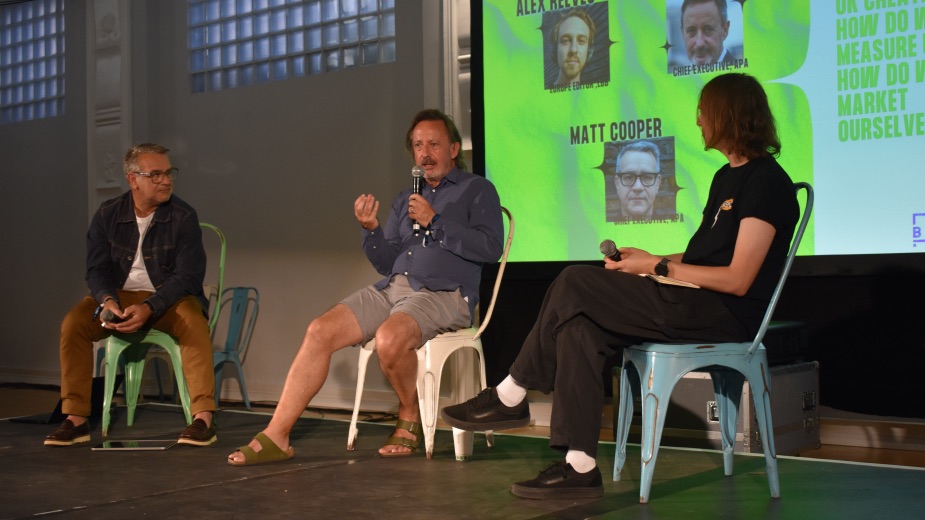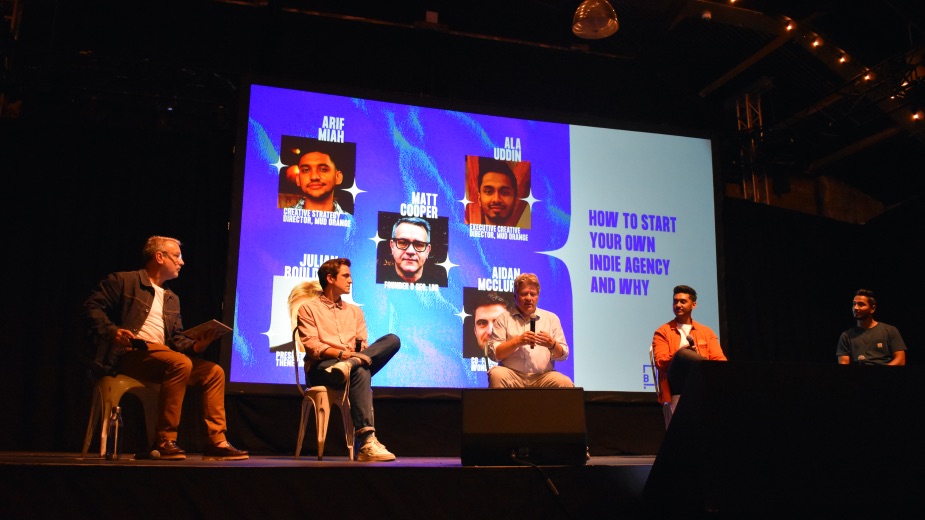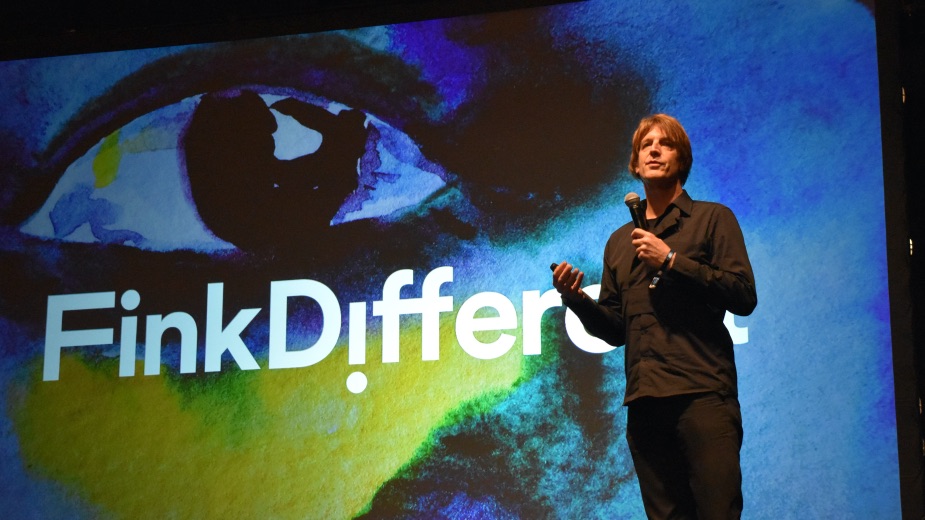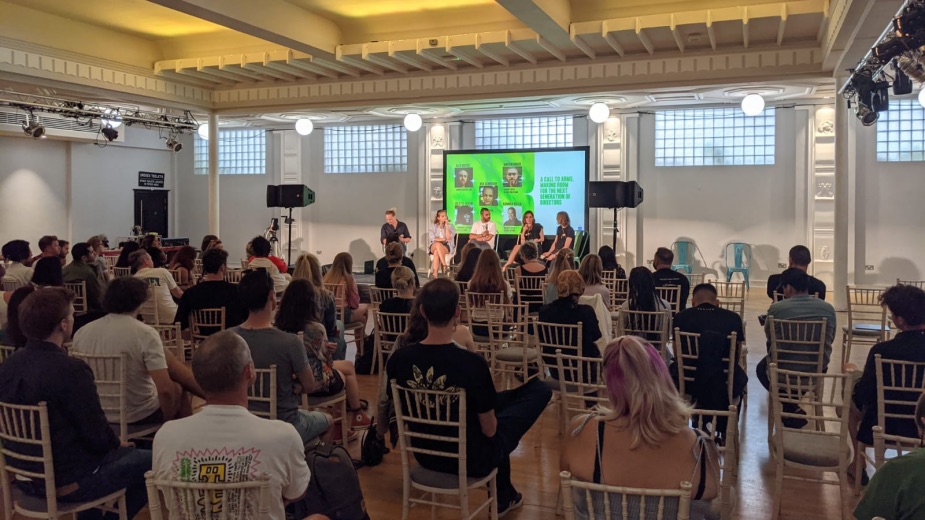
Creativity By the Seaside: UK Creative Festival Kicks off with Optimism

We do like to be beside the seaside - and the UK creative community has decamped to Margate for one of the local industry’s first major in-person events since the Covid-19 pandemic locked the community down.
Taking place in Dreamland, the iconic, historic fun fair and dance hall, it was an event with plenty of outdoors space and social distancing. But the bubbly, vintage atmosphere lent the event an upbeat and cheerful atmosphere, perfect for a creative community figuring out its next steps.
UK Creative: How do we measure up and how do we market ourselves?
Kicking off the festival in optimistic fashion and setting the mood for the day, LBB’s own Matt Cooper joined the APA’s Steve Davies to discuss UK advertising and how it fairs internationally with LBB Europe Editor Alex Reeves.
As an export-heavy market, the UK has built a reputation internationally - but that, argued Matt and Steve, has been built on a culture of cooperation - even between competitors.
“Historically Brits have always worked together incredibly well, it’s a village,” said Matt. “There’s great alliances in businesses from creatives to directors to post houses and that doesn’t happen everywhere.”

“They compete against each other but they respect each other. They can work together with competitors to make the industry better and some markets don’t get that,” said Steve.
It’s not just warm bonhomie and camaraderie - that cooperation means that the UK advertising sector has been generating huge revenues. At £26bn a year in revenue, advertising is the third biggest service sector in the UK and pulls in £11bn in exports a year.
UK government has come around to the argument that UK exports are not just about manufacturing and have been supporting the Advertising Association-led efforts as part of the UK Export Group. These efforts mean that both big brands and small businesses can pool resources and maximise impact.
Speaking to the audience of assembled students, Matt urged them to pick up that baton of collaboration and community to carry the UK industry into the future. “That’s been forged by an older group of people and I hope that’s taken on by you younger people.”
Inspiration is everywhere (even here)
Next up, Leo Burnett’s global CCO Chaka Sobhani sat down with adam&eve DDB’’s creative director Rick Brim and Droga 5 London’s CCO David Kolbusz to hear what really inspires them.
It was a talk full of amusement and plenty of banter but for Rick as a father, his inspiration firstly came from his children. “Seeing people comfortable in their own skin and that freedom and that comfort is inspiring.”
His next two were in the form of places and the stories they held and Kanye West. Though this unabashed talk lead to Rick’s complete honesty about what he thinks of the musician: “He’s a tool, a proper tool. We’re all tools but some of us are more than others! There doesn't appear to be any limits and that is inspiring.”
If you’ve ever wondered what inspires David Kolbusz, he also drew upon the Kanye/hip hop train of thought but with a more modern twist from Little Simz. He’s also inspired by emerging art and modern fashion brand This is Commitment, who take fast fashion with a pinch of salt. “It's all locally sourced stuff and ethical and grows at the speed of trend. It's interesting how the next generation is taking some of the ideas that the previous generation had and making it more creatively viable.”
This insight prompted David to share his thoughts on whether clients allow agencies creative freedom. He believes that advertising is, after all, solving business problems though not just for the sake of it. “You can't virtue signal for the sake of it, for profit. However entertainment for the sake of it, can be just as positive a thing.”
Inside In-Housing: A trend or an evolution?
In the Ballroom, LBB’s Laura Swinton was next joined by three panellists with intimate experience of in-house creativity. Over 45 minutes they helped the audience to understand the fundamentals of how it really works and whether it’s just an industry trend or an evolution of the business that will endure.
Aware that the audience likely contained students with limited knowledge of the subject, the session kicked off with the essentials: What is in-housing? The panel gave a range of answers, from “literally in the building,” put bluntly by ITV Creative’s Tony Pipes - whose agency grew organically out of the creative business of the TV channel itself - to the models of &Friends and OLIVER, which deliberately build bespoke teams within clients’ brands.
Sam Jacobs, who’s spent years working in-house at the Guardian through OLIVER, explained the strength of being in at a brand with a creative core. “We can plug in when we need to,” he explained, whether that’s the global creative, editorial or strategy arm of the Guardian.
Matt Carroll of &Friends detailed the way an in-house approach can allow a brand to flex up and down for different tasks, noting that working with Vodafone, for example, some teams work on the “bigger picture piece” while the client also launches products in play with teams built specifically for those tasks.
The theme of trust reared its head throughout, whether that’s assuring the Love Island team that ITV Creative can “really get under the skin of” it despite the sensitivities and secrets of the reality TV phenomenon, or the general “knowing you can go there with them” feeling of your colleagues being your clients, added Matt.
Tony reflected that it promotes a “better class of creative” work when people work on a single brand that they love. They also noted the creative risk-taking that this promotes, candidly admitting that as Sam said, it’s “much harder to get fired” for a bold idea when you're working for an in-house set up. Brands drop agencies all the time.
They stressed the value of external creative too, advocating for specialist expertise and injections of “fresh thinking”. While heading up an in-house agency, Tony is clearly also inspired by partners ITV works with like Uncommon and Aardman.
Conscious that some in the room might be at the start of their careers, Matt, Sam and Tony agreed that working on a variety of clients externally was a good foundation for anyone looking to work in house later, although for those looking to develop client-facing skills there’s nowhere better than in-house. All three agreed that creatives inevitably also become account managers to some degree.
In-house agencies are the norm now and will continue to be. Not having one will be unusual going forward, like not having Microsoft Word, suggested Sam. But Matt ended on a word of caution for brands looking to invest in in-house capabilities. Getting it right is “crucial but also risky”.
How to start your own indie agency... and why
A pandemic might not seem like the best time to start an agency, but Covid-19 has seen indie agencies shine, making the most of their nimble and fluid ways of working. And there’s certainly an appetite among industry oldhands and fresh new students to start their own studio or agency. At the UK Creative Festival in Margate today, the audience was guided through the hows and whys of setting up shop. LBB’s Matt Cooper was joined by panellists including network one’s Julian Boulding, Wonderhood Studios' Aidan McClure and co-founders of Mud Orange Arif Miah and Ala Uddin.
For Julian the reason why there are so many independent agencies is simple: “There are an awful lot of people who used to work for big network agencies who are now out of a job because they’re too expensive.”
It’s also about spotting a gap in the market, and for Aiden this is exactly what he did for Wonderland Studios. While Mud Orange’s Arif and Ala spotted not only a gap in the market but a way to utilise their backgrounds and heritage to connect to consumers that perhaps larger agencies were out of touch with. “In our industry, you don't have many people looking like us, doing work for people like us. We pretty much saw that it was adding huge values to these huge agencies.”

The panelists touched upon the topic of in-housing with Julian hammering home that indie agencies are set up to do a specific thing - something which is not found in-house. Whereas Arif believes that being independent means Mud Orange don’t have a model. “We never see ourselves as an in-house creative team. We want to add value whether that's to consultancy or branding.”
Though starting a new agency - especially an independent one - isn’t without its challenges. Someone who is all too aware of these is Julian who’s advice to any people starting out is to choose clientele well. “A client who says I want you to be exclusive with us for a year sounds attractive but it's a kiss of death. Their culture has to define your culture.” Ala agrees with this and recounts working with clients on a long-term basis who can make it harder to find new business as they demand all of the agency’s time.
With more and more independent agencies popping up than ever before the panel concluded with their advice for those thinking of starting their own. Julian’s is simple: “Assume you’ve got no money and think what can you do to advance your business with no money at all.” While Aiden, Ala and Arif urge creatives to hone their craft.
Graham Fink: Fink Different
“My name is Graham Fink. not a great name to have at school, all the kids used to take the piss out of me… But eventually I got to like my name because it stood up. I grew into my name and it grew into me.”
Creative advertising icon Graham Fink has been living with nominative determinism for his whole life - and so he distilled a lifetime of ‘Finking different’ with the audience in Margate. A perspective-jolting joyride through seven key points, as thrilling as the waltzer and rickety roller coaster outside.

Starting off with the deceptively simple advice, ‘stand out’. Sharing a supercut of earnest Covid ads from major brands, each identical in every beat by turgid bear, Graham demonstrated how little ‘standing out’ actually happens. In order to stand out and to generate ideas and work, Graham suggested that people need to ‘eat their heads’ - metaphorically, we think. Getting out of the habit of overthinking, which can kill ideas and prevent truly different things from being made. “Go with your heart, that’s where the magic is.”
In terms of unlocking that ‘heart’, Graham said the key was ‘more ideas’. He relayed the story of two hapless students who had attended his workshops but failed to impress with their books. He charged them with coming up with 100 ideas a day for made up briefs. When they returned two weeks later with 1400 ideas - one generated every four and a half minutes - Graham went through each idea and discovered multiple gems of potential, ideas the pair could barely remember coming up with. Having unlocked their flow, the pair were snapped up by BBH and are now senior creatives at Apple.
Other words of advice included admitting that you don’t know everything - and being fine with it - as well as approaching the world with the mindset of an explorer, looking at the things that are just under your nose… and finding ways to not only ‘fink’ differently but to see differently.
A call to arms - making room for next gen directors
Today also saw LBB’s Alex Reeves leading a talk on the next generation of directors with Martin Roker from Black Dog Films, Radical Media’s Ben Schneider, Juliette Larthe from Prettybird and Hannah Bellil of Stink Films.
The four experts have seen directors come and go so it's no surprise that Hannah believes the industry can be a confusing landscape. She adds: “It's a hugely saturated market, defining your tone of voice and having a distinct signature is getting incredibly challenging. Remaining independent is something people want to do a lot these days.”
While Juliette believes this is the most exciting time for the industry, the lack of runners on set who are starting out is an issue. And Blackdog Films’ Martin agrees with this though ponders how easy it is to give new talent a break: “Investment is a big challenge. How much time can you invest in a young talent? Young talent needs a lot of people around them to support them.”

There is a huge conversation around diversity and inclusivity and Juliette shared her thoughts around this. “Six years ago, 3% of the industry directing was women. You can’t employ people from low socioeconomic backgrounds and expect them to work on shoots for nothing. It should be mandatory that you have trainees on set, great people will rise no matter what.”
Ben and Martin point out that while there are plenty of initiatives out there for young directors to get their big break, it's up to those who have the power to give them that chance.
There’s a whole lot of changes coming around for this next generation of directors, for them to stay relevant and keep ahead of the game Radical Media’s Ben’s advice is: “Talent has the courage to draw the line with what they're comfortable with.”
In one of the liveliest panels of the day, audience members were deeply engaged particularly as the conversation got onto questions of diversity and broadening access.
Creative salaries laid bare: the tangible steps to equal pay
As the creative industries emerge from their prolonged Covid-19 hibernation and embark on a hiring spree, there’s never been a more important time to know your worth as a creative. Unfortunately, unequal pay persists across the industry, with people of colour, women, people with disabilities and members of the LGBTQI community affected in different ways.
Wrapping up day one of the UK Creative Festival, LBB’s Natasha Patel spoke to Edwina Wickham of creative recruiters Major Players and Isabel Farchy of the Creative Mentor Network to take stock of the numbers, find out how organisations can take responsibility and share advice with people concerned that their pay packets have been affected.
Kicking things off, Edwina shared the findings of Major Players recent pay survey. Findings included the shocking figure that men in the industry 3X more likely to earn over £100k and women earn on average around £10,000 less than that. And Black women earn, on average £38,000 less than a white man.
“The roller coaster we’ve had with the global pandemic has highlighted a lot of inequalities,” said Edwina.
From an employer’s perspective, Edwina said that clear and transparent salary bandings are an important tool. Isabel agreed that the issue is often a structural one. From a socio economic perspective, Isabel Farchy pointed out that people from more privileged background felt more confident using tough techniques, exploiting ‘grey areas’ in salary negotiations or finding informal sponsors and mentors. Therefore clear structures, transparency and the appropriate support, training and mentoring are key to levelling that playing field.
Access to the industry at junior levels are not enough either - the industry needs to make sure it has formal support structures in place. Within the sector you’re two times more likely to access higher paid roles if you’re from a higher socioeconomic background - and the creative sector is significantly worse than the general labour market at a whole. That’s because networking and nepotism continues to drive much career progression, while poor careers education and a culture of working for free can create barriers for many.
On free placement work, Edwina said ‘unpaid placements say more about the company that you’re going to work for than it does about you’ and recommended young people avoid any employer unwilling to pay even the minimum wage.
Isabel noted that socioeconomic background was a dimension of diversity that's rarely included in salary surveys and research, something she said was particularly significant in the UK which has a massive division between state and private education.
The panellists also tackled ageism, and noted for older women hybrid working and flexibility were going to be important trends. However, notes Edwina, agencies that had talked about flexible and remote working during the pandemic have started to push people back to the office full time. Moreover, there was a question mark around whether employers would try to start pushing salaries down for remote workers, which could cause greater pay inequalities in the future. Overall, the message was that pay inequality was a systemic problem and the burden for solving it can’t fall on the shoulders of individual employees from marginalised groups.
In the post-lockdown environment, Edwina noted that agencies are on big recruitment drives. While this means that agencies are hiring with budgets in mind, it also means that there are opportunities for people from marginalised groups to jump ship from employers treating them unfairly.
“Now is the best opportunity to go out there and see what’s around,” said Edwina. “There’s no harm in having conversations.”













